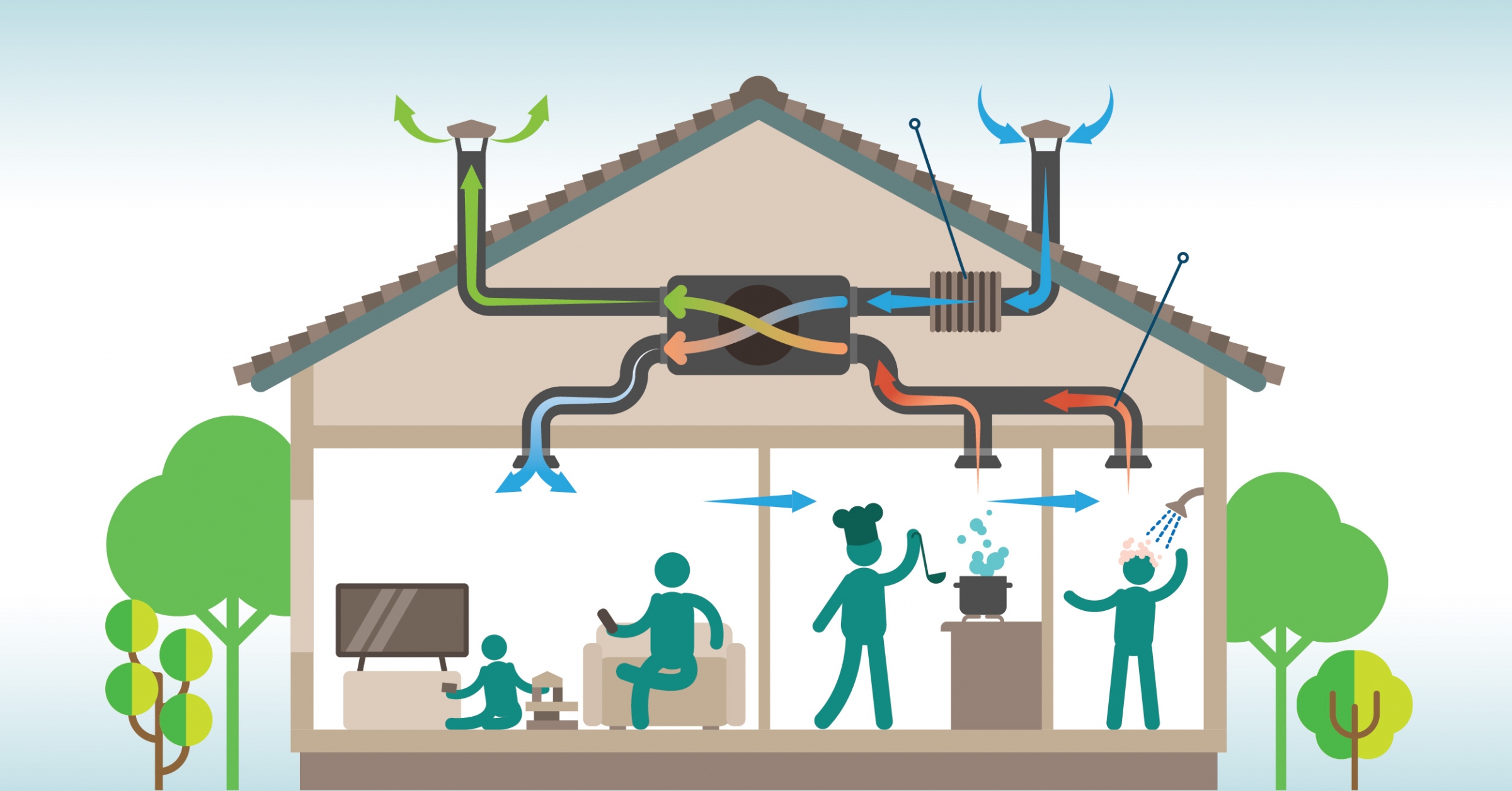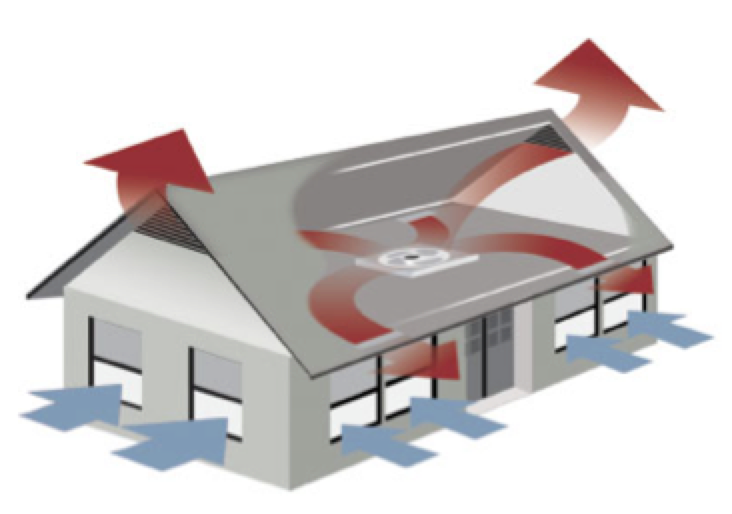How Home Ventilation Melbourne Enhances Comfort and Well-Being
Wiki Article
Understanding the Value of Home Ventilation for a Healthier Living Setting
Home air flow plays a vital function in maintaining a healthy and balanced living atmosphere. It assists in the exchange of outside and indoor air, which is very important for improving air quality. Without correct air flow, homes can come to be breeding grounds for allergens and contaminants. The effects of inadequate air circulation can be significant. This raises the questions of just how house owners can efficiently execute ventilation strategies to secure their health and wellness. Comprehending these approaches is essential.
The Basics of Home Air Flow
Home ventilation acts as an essential element of interior air top quality and comfort. It includes the process of exchanging stagnant indoor air with fresh outside air, consequently reducing moisture and managing temperature. Proper ventilation systems can include natural techniques, such as open home windows and vents, as well as mechanical systems, such as exhaust followers and air exchangers. Efficient home air flow aids avoid problems like indoor mold development and the buildup of dangerous bits. It likewise enhances overall energy performance, as well-ventilated rooms can maintain comfortable temperatures with much less dependence on home heating and cooling down systems. Recognizing the essentials of home air flow is important for homeowners seeking to develop a healthier living atmosphere for themselves and their families.
Usual Resources of Indoor Air Contamination

Numerous might not understand it, indoor air pollution can stem from numerous sources within a house. Typical contributors consist of volatile organic substances (VOCs) emitted from paints, solvents, and cleansing items. Household appliances, such as gas ranges and fire places, can release hazardous gases like carbon monoxide and nitrogen dioxide. Additionally, mold and mildew and mold flourish in damp locations, launching spores that influence air high quality. Pet dander, dirt termites, and plant pollen can gather inside your home, more worsening air pollution levels. Cigarette smoking indoors produces poisonous chemicals that stick around in the air. Ultimately, developing products, consisting of asbestos and formaldehyde, can off-gas damaging substances. Recognizing these resources is necessary for maintaining a much healthier indoor setting and advertising effective air flow approaches.
Health Consequences of Poor Air Flow
Indoor air pollution can have substantial health ramifications, specifically when air flow is inadequate. Poor ventilation can result in the build-up of damaging toxins, such as volatile organic compounds, mold, and particle issue. This buildup may result in respiratory concerns, consisting of asthma, allergic reactions, and persistent obstructive pulmonary disease. Individuals may experience signs like migraines, exhaustion, and inflammation of the eyes, nose, and throat. Susceptible populaces, such as youngsters and the senior, go to higher risk for severe health effects. Long-term exposure to badly ventilated environments can also contribute to much more major conditions, consisting of heart diseases. Making sure appropriate ventilation is essential for maintaining a healthy and balanced living atmosphere and reducing the threat of wellness issues connected with interior air pollution.Efficient Air Flow Strategies for Your Home
Appropriate ventilation is vital for maintaining a healthy and balanced interior atmosphere, and implementing reliable approaches can substantially improve air quality. House owners can begin by ensuring that exhaust fans are set up in cooking areas and bathrooms to get rid of excess moisture and odors. Opening up home windows on a regular basis permits fresh air to flow, especially throughout mild weather. Additionally, utilizing air purifiers with HEPA filters can help catch airborne pollutants. For homes with heating and cooling down systems, maintaining HVAC systems and changing filters regularly is important for peak efficiency. Integrating natural ventilation strategies, such as cross-ventilation, can likewise improve air flow. Sealing any kind of leakages in home windows and doors prevents unwanted drafts, which can interfere with controlled air flow, ultimately leading to improved interior air quality and convenience.Maintaining Ideal Air Quality Year-Round
To maintain suitable air quality year-round, house owners need to take on an aggressive technique to managing their indoor setting. Routinely keeping track of interior air quality is critical; this consists of checking for contaminants such as dust, mold, and volatile organic compounds (VOCs) Executing reliable air flow systems, such as exhaust followers and air purifiers, can greatly reduce airborne contaminants. In addition, routine upkeep of a/c systems warranties peak performance and air blood circulation. Homeowners should additionally consider humidity degrees, as too much dampness can lead to mold growth. Seasonal changes may demand adjustments in air flow approaches to fit varying exterior air high quality. By focusing on these practices, home owners can develop a healthier space, promoting overall wellness for all residents throughout the year.Regularly Asked Questions
How Can I Tell if My Home Needs Much Better Ventilation?
To establish if a home needs much better ventilation, one should observe indicators such as consistent humidity, mold growth, moldy smells, condensation on home windows, or raised allergic Home Ventilation Melbourne reaction signs and symptoms, showing poor air movement and possibly inadequate indoor air top quality.What Are the Indicators of Poor Indoor Air High Quality?

Can Houseplants Improve Indoor Air Top Quality Successfully?
The efficiency of houseplants in boosting interior air quality is disputed. While some studies recommend they can absorb toxins and create oxygen, their total impact might be minimal contrasted to correct air flow and air filtering systems.Exactly how Typically Should I Adjustment My Air Filters?
The regularity of air filter adjustments normally relies on use and filter kind. Usually, it is suggested to change filters every 3 months, though families with allergic reactions or pets may require more constant adjustments for suitable efficiency.Exist Any Details Ventilation Equipments for Allergy Sufferers?
Several ventilation systems, such as HEPA-filtered devices, properly reduce irritants in the air. Home Ventilation Melbourne. These systems catch animal, pollen, and dust dander, offering allergic reaction sufferers with a cleaner, healthier indoor setting while taking care of air quality successfully
It assists in the exchange of indoor and outside air, which is vital for enhancing air top quality. Home air flow offers as a vital part of interior air top quality and convenience. It involves the process of trading stagnant interior air with fresh exterior air, consequently lowering humidity and controlling temperature. Indoor air pollution can have considerable health ramifications, especially when ventilation is inadequate. Proper ventilation is necessary for keeping a healthy and balanced indoor environment, and executing effective techniques can significantly boost air quality.
Report this wiki page